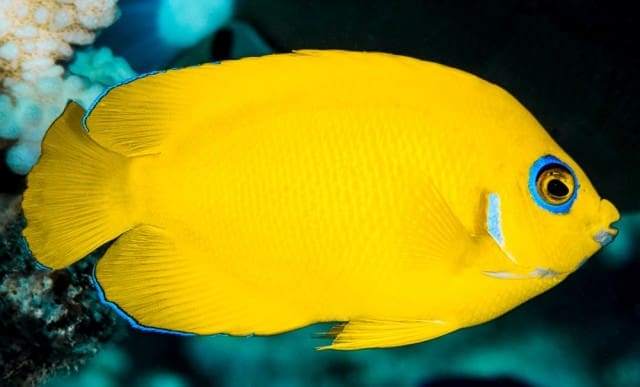The Lemonpeel Angelfish (Centropyge flavissima) is a vibrant marine fish known for its striking yellow coloration and distinctive blue accents. Popular among aquarists, this species adds a splash of color to marine aquariums.
Key Information
• Small fish safe: Yes
• Small invert safe: ⚠️ With caution
• Coral safe: ⚠️ With caution
• Minimum tank size: 265 liters (70 gallons)
• Adult size: Up to 14 cm (5.5 inches)
• Diet: Omnivorous (marine algae, spirulina, mysis shrimp, brine shrimp, high-quality angelfish preparations)
• Be aware of: May nip at corals and clam mantles; requires ample live rock for grazing and hiding; can be territorial, especially towards similar species.
Appearance and Coloration
The Lemonpeel Angelfish is easily recognized by its:
• Body: Bright yellow hue.
• Markings: A vivid blue ring encircling the eyes and blue highlights on the fins.
Juveniles may display a black spot (ocellus) on their sides, which fades as they mature.
Natural Habitat and Behavior
In the wild, Lemonpeel Angelfish are found throughout the Indo-Pacific region, inhabiting coral-rich areas of lagoons and seaward reefs. They prefer environments with abundant coral cover and are often seen at depths ranging from 3 to 60 meters. These fish are typically solitary or found in pairs and are known to be territorial.
Tank Requirements and Water Parameters
To ensure the well-being of the Lemonpeel Angelfish in captivity:
• Minimum Tank Size: A 70-gallon (265 liters) aquarium is recommended to provide ample space for swimming and territory establishment.
• Water Parameters:
• Temperature: 22°C – 27°C (72°F – 80°F)
• pH: 8.1 – 8.4
• Specific Gravity: 1.020 – 1.025
• Aquascaping: Incorporate plenty of live rock to create hiding spots and grazing areas, mimicking their natural reef environment.
• Lighting: Moderate lighting is suitable.
• Water Movement: Moderate flow to simulate their natural habitat.
Maintaining stable water conditions and regular water changes are crucial for their health.
Diet and Feeding
Lemonpeel Angelfish are omnivorous, with a diet that includes both plant and animal matter:
• Diet: Offer a varied diet consisting of:
• Marine algae and spirulina
• Mysis shrimp
• Brine shrimp
• High-quality angelfish preparations
• Feeding Frequency: Feed small amounts multiple times daily to meet their nutritional needs.
Providing ample live rock will allow natural grazing behavior, which is beneficial for their health and well-being.
Compatibility and Social Structure
Lemonpeel Angelfish can exhibit territorial behavior, especially towards conspecifics and similar species:
• Social Structure: Best kept singly unless in a very large aquarium where multiple individuals can establish territories.
• Temperament: Generally peaceful towards other species but may become aggressive towards similar-looking fish.
• Compatible Tank Mates: Suitable companions include peaceful community fish such as gobies, blennies, and wrasses. Caution is advised when housing with other angelfish or species with similar coloration.
Observing their interactions and providing ample space can help mitigate aggressive behaviors.
Important Considerations
• Reef Compatibility: While often considered reef-safe, individual specimens may nip at corals and clam mantles. Monitoring their behavior is essential, especially in reef setups.
• Acclimation: They may be shy upon introduction but typically become more confident over time.
• Health: Ensure a varied diet and stable water conditions to prevent common health issues.
With proper care and attention to their specific needs, Lemonpeel Angelfish can be a vibrant and rewarding addition to a marine aquarium.
